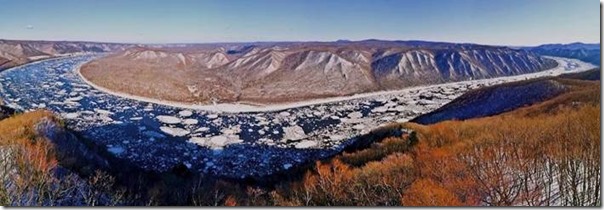Picture: Free-flowing Amur-Heilong River forming Sino-Russian border (Taipinggou National Nature reserve)
The "Heritage Dammed" Preliminary Report released by the Rivers without Boundaries International Coalition (RwB) and World Heritage Watch contains contributions from 25 CSOs, experts and affected communities around the world. LINK to the Report.
THE KEY MESSAGES:
– Freshwater ecosystems have become the most threatened part of the Planet’s biodiversity. Water infrastructures: dams, dykes and canals play key role in degrading aquatic ecosystems. They forever change natural morphology and hydrology patterns of rivers and lakes, half of freshwater ecoregions globally are already degraded. Dams often threaten cultures, spiritual values and livelihoods of local communities.
– The Report presents 51 recent cases of water infrastructure encroachment on the World Heritage properties, of which 42 sites are threatened by hydropower. The World Heritage List signifies most important cultural and natural values of the humankind. If these areas with the highest protection standard are degraded so quickly, then what all other freshwater ecosystems are facing?
– Despite 50% decrease in hydropower development in recent years, the number of natural sites threatened by water infrastructure has increased by 14%. Dam builders are moving into remote wilderness areas, where indigenous peoples rely on free flowing rivers to preserve their cultural identity and way of life. Previously protected areas are delisted or weakened to welcome hydropower.
– Twelve in-depth case studies illustrate and analyze global threat to the World Heritage, ranging from the Selous Game reserve in Tanzania to Los Glaciares National Park in Argentina, from Tropical Rainforest Heritage of Sumatra to Upper Svaneti in Georgia.
– Free flowing rivers are deprived of efficient protection worldwide. Among all large wild rivers only one stretch on Amazon and three inland deltas are protected by the World Heritage Convention globally. The report demonstrates potential and urgency for conservation by six examples of still wild rivers: Congo, Mekong, Vjosa, Greater Zab, Amur and Karnali. All those are targeted for serial damming.
– The Draft Report contains preliminary recommendations how to protect natural and cultural values of freshwater ecosystems in the context of the World Heritage Convention and beyond.
We are in the middle of a great crisis and to protect our freshwater heritage we should take action now:
Keep World Heritage sites, as well as any other biodiversity hotspots protected areas, off-limits of large-scale water infrastructure and prevent upstream and downstream impacts from hydropower.
Use all existing legal conservation tools to ensure protection in perpetuity of the remaining free-flowing rivers and design new tools for effective protection;
Expedite adjustment and removal from natural areas of water infrastructure that harms key freshwater biodiversity and conduct strategic environmental assessments to optimize tradeoffs at basin-wide level;
Stop the "Climatewash": allowing destruction of rivers by hydropower under the excuse "it is a remedy for climate change", while dams bring today destruction similar or worse than anticipated impacts of climate change on our rivers in future;
Enhance investment safeguards and due diligence at financial institutions to divert funds from bad water infrastructure projects to more sustainable alternatives for clean energy and water supply.
Our Planet has no more wild rivers which we can afford to sacrifice for dam-based hydropower and other destructive large water infrastructure.
The Draft Report is open for comments, additional recommendations and case-studies to be submitted by May 20th, 2019.
Contact: Dr. Eugene Simonov, Rivers without Boundaries Coalition. simonov@riverswithoutboundaries.org


